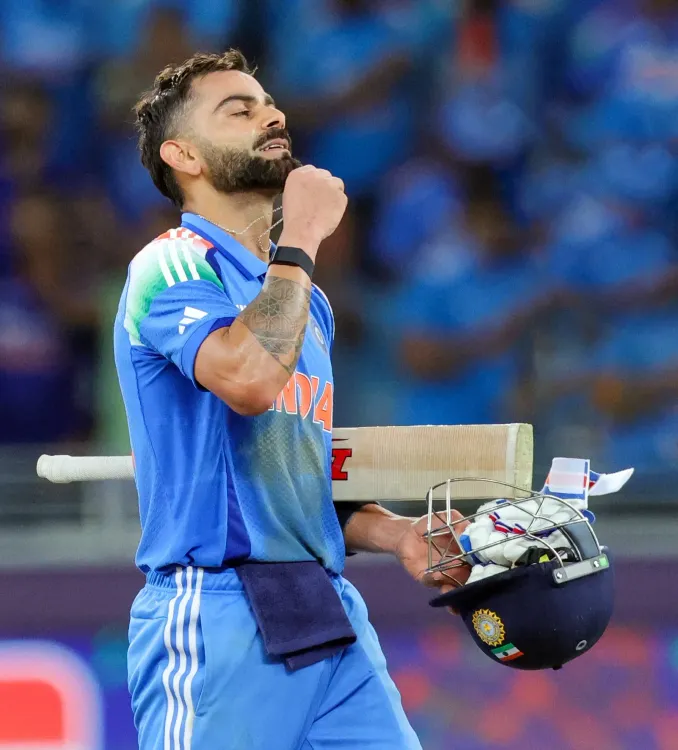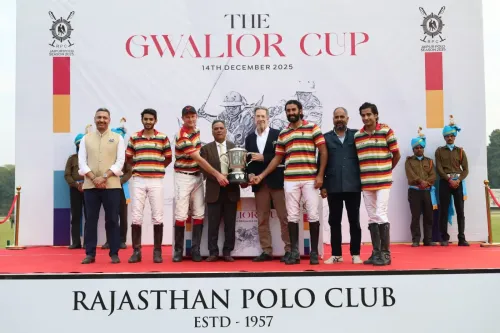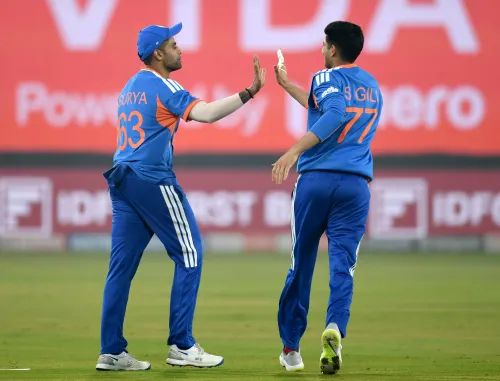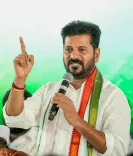Champions Trophy: Kohli’s Impact Will Be Remembered, Says Phillips

Synopsis
Key Takeaways
- Virat Kohli will play his 300th ODI on Sunday.
- He joins a select group of Indian cricketers with this achievement.
- Glenn Phillips emphasizes Kohli's lasting legacy in cricket.
- New Zealand's team culture has been pivotal to their success.
- Adapting to pitch conditions is crucial for the team's strategy.
Dubai, March 1 (NationPress) On Sunday, Virat Kohli will mark his 300th One-Day International appearance as India faces New Zealand in their concluding Group A match of the 2025 Champions Trophy at the Dubai International Stadium. This match will see Kohli join the elite group of Indian cricketers, becoming the seventh to reach this milestone, following in the footsteps of Sachin Tendulkar, Rahul Dravid, MS Dhoni, Mohammed Azharuddin, Sourav Ganguly, and Yuvraj Singh.
Before the game, Glenn Phillips, a New Zealand all-rounder, commented on Kohli's achievement, stating that playing 300 ODIs is a remarkable feat and that his legacy in the 50-over format will endure for years.
“He’s undoubtedly an exceptional player. Getting to know him personally is fantastic. His dedication and the impact he’s made on the sport, particularly for Indian cricket and young players entering the game, is remarkable,” Phillips said.
“His legacy will inspire many, and reaching 300 ODIs is a significant accomplishment, especially in an era when one-day cricket is played less frequently. It's a tremendous achievement for him,” he added during the pre-match press conference.
Both India and New Zealand have secured their spots in the semifinals of the Champions Trophy, with the winner of Sunday’s match set to face Australia, while the losing team will go up against South Africa. New Zealand has consistently performed above expectations in ICC ODI tournaments, a success attributed to their strong team culture, according to Phillips.
“It starts with our team culture, which is greater than any individual. It’s about each player adhering to their personal processes. We trust one another, and each of us plays differently. Once we’re on the field, we trust our teammates to execute what they’ve practiced,” he explained.
“Everyone puts in the effort, and they count on me to do my part as well. This mutual trust fosters a great team atmosphere. Cricket can be unpredictable; results don’t always favor you, but we’ve established a solid foundation to build upon,” Phillips stated.
In addition to his impressive batting, Phillips has also been in the spotlight for his acrobatic catches, attributing his success to a bit of luck. “I think luck plays a significant role. I wish I could say I have a secret glue, but that’s not the case,” he joked.
“My palms tend to be sweatier than anything else. Ultimately, it comes down to consistent hard work and mastering the basics, with luck playing its part occasionally.”
When asked about adapting to the conditions in Dubai for their first game at this venue, Phillips remarked, “The beauty of playing in Pakistan is that every pitch has presented unique challenges. This has been excellent preparation for us as we arrive in Dubai, where the pitch will be yet another different experience.”
“We’ve faced various situations and pitches—some have spun, while others have been flat and fast, with smaller boundaries. This ground offers a distinct challenge, potentially being slower with less grass and slightly slower outfields.”
“We pride ourselves on our adaptability. While we can’t guarantee success every time, we feel prepared. We support each other no matter the circumstances. When facing new situations and environments, we rise to the challenge and always strive to compete,” Glenn Phillips concluded.










